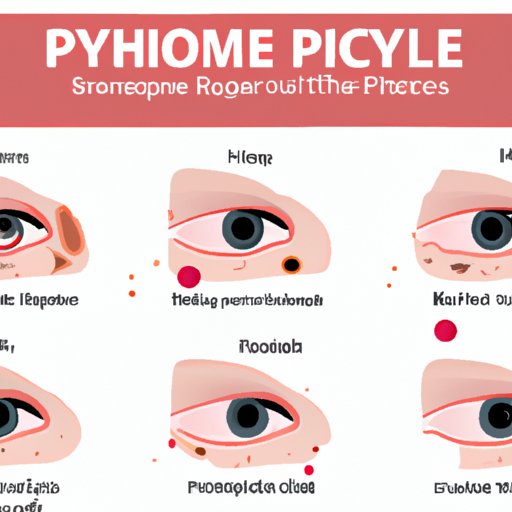
Introduction
The thought of having a pimple inside your eye can be quite scary. However, many people do not realize that it is a common problem and can occur in anyone at any age. Although eye pimples are usually harmless, they can be quite uncomfortable and can even affect your vision in some cases. In this article, we will explore the causes, symptoms, myths, and effective treatments for eye pimples so you can alleviate the discomfort and prevent them from recurring in the future.
Understanding Eye Pimples: Causes, Symptoms, and Risk Factors
Eye pimples, also known as hordeolum or styes, are small bumps that appear on the eyelid or inside the eye. They are caused by the bacteria Staphylococcus aureus that grows on the skin and can infect the eyelash follicles or oil glands in the eyelids. Touching your eyes with unclean hands or sharing makeup with others can increase the risk of developing these pimples.
The common symptoms of eye pimples include swelling of the eyelid, redness, pain, itchiness, blurred vision, and dry eyes. In some cases, the pimples can grow bigger and cause pus or discharge. People with a history of recurrent eye infections, blepharitis (inflammation of the eyelids), or acne are more prone to developing eye pimples.
What to Do When You Get a Pimple on Your Eyeball
There are several home remedies you can try to ease the discomfort and promote healing of eye pimples. Applying a warm compress to the affected area for 10-15 minutes, three to four times a day can help reduce the swelling and improve blood circulation. Make sure to use a clean washcloth and avoid pressing too hard on the eye.
It is also crucial to maintain good eye hygiene by washing your hands regularly, avoiding touching your eyes, and using your own makeup and towels. If you wear contact lenses, make sure to disinfect them properly to prevent infections. If the pimples persist or become more severe, you should consult a doctor to get proper treatment.
Eye Pimples: Myth vs. Reality
Many people have misconceptions about eye pimples that can lead to incorrect treatments or unnecessary fears. One of the most common myths is that eye pimples are caused by poor hygiene or by sleeping with makeup on. In reality, anyone can get eye pimples, even with good hygiene habits, and wearing makeup alone is not a direct cause of the pimples.
Another myth is that popping or squeezing the pimple can speed up the healing process. This is not true and can actually worsen the infection and cause scarring. It is also essential to avoid using expired or contaminated eye makeup or cosmetics and to clean your eyelids with a mild soap or eye cleanser.
Treating Eye Pimples: Top Remedies and Precautionary Measures
In addition to warm compresses, there are several other natural remedies you can try to alleviate the symptoms of eye pimples. Aloe vera gel, tea tree oil, and turmeric paste are known for their anti-inflammatory and antibacterial properties and can be applied topically to the affected area. Over-the-counter pain relievers such as ibuprofen or acetaminophen can also help reduce pain and swelling.
It is crucial to avoid wearing contact lenses or eye makeup until the pimple has healed completely. If the pimple persists for more than a week or affects your vision, you should seek medical attention. Your doctor may prescribe antibiotics, prescribe eye drops, or drain the pimple if necessary.
When To Seek Medical Attention For Eye Pimples
Although eye pimples are usually harmless, they can cause complications if left untreated, especially if they occur inside the eye. If you experience persistent pain, swelling, or other symptoms, or if the pimple grows to a size where it affects your vision, you should seek medical attention immediately.
Your doctor may perform a check-up to rule out any other eye conditions or infections and prescribe appropriate treatment. Infected eye pimples can lead to other complications such as cellulitis or inflammation of the eye socket, or chalazion or the formation of a hard lump on the eyelid.
Expert Answers to Frequently Asked Questions About Eye Pimples
Q: Can eye pimples be contagious?
A: Eye pimples are not contagious except for the rare condition of recurrent chalazion caused by the bacteria Mycobacterium chelonae.
Q: Can eye pimples cause blindness?
A: Eye pimples usually do not cause permanent vision loss. However, if the pimple occurs inside the eye or affects the cornea, it can lead to blurred vision or other complications.
Q: Is it normal to get eye pimples frequently?
A: Recurrent eye pimples can be a sign of an underlying condition such as blepharitis, diabetes, or weakened immune system. It is essential to consult a doctor if you experience frequent eye pimples.
Conclusion
Eye pimples can be quite uncomfortable and affect your vision, but with the right treatment and precautions, they can be managed effectively. Maintaining good eye hygiene, avoiding sharing makeup, and applying warm compresses are some of the ways to prevent eye pimples from recurring. It is essential to seek medical attention if the pimple persists or leads to other complications. Remember to prioritize your eye health and seek help at the first sign of discomfort to prevent potential complications.




